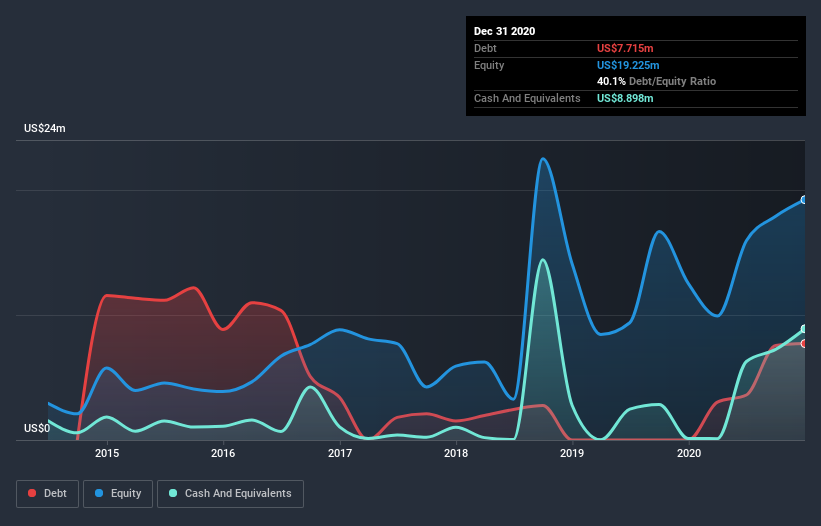SRAX (NASDAQ:SRAX) Has Debt But No Earnings; Should You Worry?
The external fund manager backed by Berkshire Hathaway's Charlie Munger, Li Lu, makes no bones about it when he says 'The biggest investment risk is not the volatility of prices, but whether you will suffer a permanent loss of capital.' So it seems the smart money knows that debt - which is usually involved in bankruptcies - is a very important factor, when you assess how risky a company is. We can see that SRAX, Inc. (NASDAQ:SRAX) does use debt in its business. But the real question is whether this debt is making the company risky.
When Is Debt A Problem?
Debt assists a business until the business has trouble paying it off, either with new capital or with free cash flow. In the worst case scenario, a company can go bankrupt if it cannot pay its creditors. However, a more common (but still painful) scenario is that it has to raise new equity capital at a low price, thus permanently diluting shareholders. Of course, debt can be an important tool in businesses, particularly capital heavy businesses. The first thing to do when considering how much debt a business uses is to look at its cash and debt together.
Check out our latest analysis for SRAX
What Is SRAX's Net Debt?
You can click the graphic below for the historical numbers, but it shows that as of December 2020 SRAX had US$7.72m of debt, an increase on none, over one year. But it also has US$8.90m in cash to offset that, meaning it has US$1.18m net cash.
How Healthy Is SRAX's Balance Sheet?
Zooming in on the latest balance sheet data, we can see that SRAX had liabilities of US$19.0m due within 12 months and liabilities of US$753.0k due beyond that. Offsetting this, it had US$8.90m in cash and US$2.61m in receivables that were due within 12 months. So its liabilities total US$8.28m more than the combination of its cash and short-term receivables.
Since publicly traded SRAX shares are worth a total of US$111.8m, it seems unlikely that this level of liabilities would be a major threat. However, we do think it is worth keeping an eye on its balance sheet strength, as it may change over time. Despite its noteworthy liabilities, SRAX boasts net cash, so it's fair to say it does not have a heavy debt load! When analysing debt levels, the balance sheet is the obvious place to start. But ultimately the future profitability of the business will decide if SRAX can strengthen its balance sheet over time. So if you want to see what the professionals think, you might find this free report on analyst profit forecasts to be interesting.
Over 12 months, SRAX reported revenue of US$8.6m, which is a gain of 141%, although it did not report any earnings before interest and tax. So its pretty obvious shareholders are hoping for more growth!
So How Risky Is SRAX?
We have no doubt that loss making companies are, in general, riskier than profitable ones. And in the last year SRAX had an earnings before interest and tax (EBIT) loss, truth be told. Indeed, in that time it burnt through US$15m of cash and made a loss of US$15m. With only US$1.18m on the balance sheet, it would appear that its going to need to raise capital again soon. The good news for shareholders is that SRAX has dazzling revenue growth, so there's a very good chance it can boost its free cash flow in the years to come. While unprofitable companies can be risky, they can also grow hard and fast in those pre-profit years. When analysing debt levels, the balance sheet is the obvious place to start. But ultimately, every company can contain risks that exist outside of the balance sheet. Case in point: We've spotted 3 warning signs for SRAX you should be aware of, and 1 of them is significant.
If, after all that, you're more interested in a fast growing company with a rock-solid balance sheet, then check out our list of net cash growth stocks without delay.
This article by Simply Wall St is general in nature. It does not constitute a recommendation to buy or sell any stock, and does not take account of your objectives, or your financial situation. We aim to bring you long-term focused analysis driven by fundamental data. Note that our analysis may not factor in the latest price-sensitive company announcements or qualitative material. Simply Wall St has no position in any stocks mentioned.
Have feedback on this article? Concerned about the content? Get in touch with us directly. Alternatively, email editorial-team (at) simplywallst.com.

